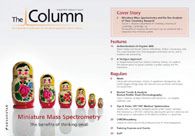World's biggest allergy study
The University of Manchester (Manchester, UK) has announced the start of the world?s biggest allergy study. Eurofins (Brussels, Belgium) is one of the main industry laboratory participants in the four-year study sponsored by the European Commission.
The University of Manchester (Manchester, UK) has announced the start of the world’s biggest allergy study. Eurofins (Brussels, Belgium) is one of the main industry laboratory participants in the four-year study sponsored by the European Commission. Eurofins were selected following validation of liquid chromatography–tandem mass spectrometry (LC–MS–MS) for this type of research.
The project has attracted funding of 9 million euros, advancing on an earlier 14.3 million euro research study. Researchers from across Europe, Australia and the US are taking part in the European Commission-sponsored research known as the Integrated Approaches to Food Allergen and Allergy Risk Management (IFAAM) to formulate a standardized management process for companies involved in food manufacturing.
Professor Clare Mills of the Allergy and Respiratory Centre of The University of Manchester’s Institute of Inflammation and Repair will head-up the study. Mills said, “This is a massive research project which will have far-reaching consequences for consumers and food producers. The evidence base and tools that result from this will support more transparent precautionary ‘may contain’ labelling of allergens in foods which will make life easier for allergy sufferers as they try to avoid problem foods.”
For more information please visit:
www.eurofins.com
This story originally appeared in The Column. Click here to view that issue.

AOAC International Awarded NIST Grant for Developing Drug Testing Standards
October 31st 2024The grant will be part of a new collaborative scientific initiative to address the need for standards that define the desired performance of lateral flow immunoassay test strips to detect illicit drugs in tablets and powders.
AI and GenAI Applications to Help Optimize Purification and Yield of Antibodies From Plasma
October 31st 2024Deriving antibodies from plasma products involves several steps, typically starting from the collection of plasma and ending with the purification of the desired antibodies. These are: plasma collection; plasma pooling; fractionation; antibody purification; concentration and formulation; quality control; and packaging and storage. This process results in a purified antibody product that can be used for therapeutic purposes, diagnostic tests, or research. Each step is critical to ensure the safety, efficacy, and quality of the final product. Applications of AI/GenAI in many of these steps can significantly help in the optimization of purification and yield of the desired antibodies. Some specific use-cases are: selecting and optimizing plasma units for optimized plasma pooling; GenAI solution for enterprise search on internal knowledge portal; analysing and optimizing production batch profitability, inventory, yields; monitoring production batch key performance indicators for outlier identification; monitoring production equipment to predict maintenance events; and reducing quality control laboratory testing turnaround time.